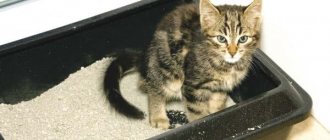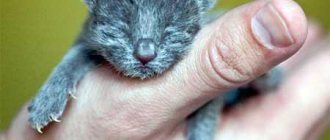Cats are not as open animals as dogs, and when menstruation comes into the house, they are not happy about it, but tend to hide in a dark corner. The reason for this behavior is that meowing pets are introverts by nature. Although some owners who have no experience with cats do not know about this prefix. They believe that the animal is sick, which is why it is hiding.
In this article, wrap it up, an analysis of this cat habit is given, and advice is given on how to get the cat to get rid of it.
Secretive cat nature
Wild cats are predominantly nocturnal predators, able to navigate well in low light and come out to hunt at dusk. In the morning, the animals return to their daytime roosts, located in hidden places, such as:
- rock cleft;
- fork of branches in dense foliage;
- tree hollow;
- earth hole;
- hole under the roots.
Pets. The activity of domestic cats is also confined to the dark time of day. The mustachioed tabbys devote daylight hours to lazy pastime, getting up only to have a snack, visit the litter box, and lick themselves.
Kittens can hide:
- in the closet among bedding and things;
- on a bookshelf;
- in a cardboard box (read more about why cats love boxes);
- in a pan, vase, empty flower pot;
- in the washing machine;
- in a laundry basket;
- under a closet, sofa or bed;
- behind the central heating radiator;
- behind the chair;
- under the blanket.
In addition to a light half-sleep with closed eyes and the “inner guard” turned on, cats have real deep sleep, which is necessary to maintain health and restore strength. However, such complete relaxation is only possible in complete safety, silence and darkness. That is why mustachioed striped creatures choose hidden dark corners for themselves.
According to research by zoologists, the animal feels comfortable when the walls of the shelter touch the body. That’s why a cat’s favorite places to sleep are never too spacious.
Anti-stress nook
Personal space is of particular importance in a stressful situation, since a wise protective instinct commands cats to sit in a secluded place until the threat has passed. A disturbed cat will dive into its house, and if there is none, into one of its favorite inaccessible corners of the apartment.
Sources of fear. A loud noise or a previously unseen object can frighten an animal. So, a real shock for a timid pet will be a major repair or installation of large household appliances. Cats also quickly get tired of overly active guests and run away to the most distant dark room. Stress can be triggered by a move, an exhibition or a visit to the veterinary clinic.
Help for kids. The need to scoot and hide in a cozy den is characteristic of cats of all ages, but the psyche of small kittens is especially sensitive, instinctively striving for something warm and soft, so similar to the fluffy side of their mother. In order for the baby to quickly adapt to the new home, it is recommended to purchase a sleeping place in one of the configurations at the pet store:
- closed soft bed;
- frame house;
- “tunnel” or “hole” with a rounded mouth;
- an envelope or sleeping bag with a flattened entrance.
It would be great if the inner surface of the “den” is lined with plush or faux fur. The walls of a warm and soft shelter muffle extraneous noise and light, allowing the kitten to sleep peacefully. To prevent your baby from feeling lonely, you can put a plush toy or bedding in the house that smells like a native nest.
Cats that require special care. In addition to kittens that have just been weaned from their mother, the following are prone to “games of hide and seek”:
- timid and nervous individuals;
- young cats in the presence of an adult and confident fellow tribesman;
- cats picked up on the street and not used to living in a house;
- animals that have been mistreated and physically harmed at the hands of humans.
Owner actions.
The owner is not recommended to forcibly disturb the peace of an animal hidden in the saving darkness - this is how the body restores psychological balance.
Unsocialized wild animals can “thaw out” only with time and gentle handling. With a long “reclusion”, you can try to lure the cat out of the “den” with the help of a toy or treat.
Hiding, provoked by the clarification of the relationship between two individuals, will resolve itself when the animals get used to each other and establish the rules of the hierarchy. To avoid provoking a fight, it is recommended to install two different trays, two houses and two food bowls in different parts of the house.
Hunting games
Wild animals. Representatives of the cat family belong to ambush predators, not adapted to long pursuit of prey, and therefore hunt from shelters. Lions lie down in front of a herd of antelopes in the grass of the savannah, a spotted jaguar is hidden by the play of light among the branches, and a domesticated murka is spread out on the asphalt, sneaking up on a pigeon.
Domestic individuals. The mustachioed striped one, which does not leave the apartment, has fun through hunting games, suddenly jumping out of its secret hiding place. Especially young, uncastrated animals and representatives of hybrid breeds obtained by infusion of real “wild blood” like to go on safaris.
Any moving object can be the object of the hunt: from a ball made of candy foil to a shaggy vacuum cleaner and the ankles of the hostess. The simulation of an attack and capture of the “victim” turns out to be quite realistic, using the entire cat’s arsenal of 30 teeth and 20 claws.
What should the owner do? To wean your pet from making unexpected attacks, it is recommended to work with it more, socializing it and teaching it to play in a “civilized” manner. An abundance of various fun activities will help to throw out the hunting ardor, and a game complex and targeted training will teach the energetic cat intricate tricks.
Some cats have a genetic tendency to hide food supplies in secluded corners because their wild ancestors did not always manage to eat regularly.
Ambush hunting
Representatives of the cat family are not physiologically adapted to long, exhausting running and prolonged pursuit of prey, preferring hiding to catching up. Even the legendary cheetah sprinter sneaks as close to its prey as possible for a short, quick lunge.
Ambush hunting is common to all cats, and a domestic cat may suddenly imagine itself as a lion, jumping out from under the blanket after some moving object. Young active animals are especially prone to hunting games, loving to arrange a safari on a vacuum cleaner brush or the ankles of the mistress.
Sometimes cats can hide food in secret places, stocking up for a “rainy day,” so finding a dried piece of raw meat in their bed is a common occurrence for a cat owner.
Waiting for offspring
The desire for privacy in a safe place is typical of cats preparing to become mothers. They are driven by parental instinct, since in the natural environment a woman in labor and her offspring can be easy prey for the ubiquitous hungry predators. Feeling the birth of a new life, the cat:
- turns out to be selective in food, showing either clear signs of toxicosis or increased appetite;
- becomes more cautious and less playful, trying not to make sudden movements and acrobatic jumps;
- gains weight and becomes rounder at the sides;
- pays special attention to her belly, licking it and even growling at the kids getting naughty inside;
- in the last week of pregnancy detects swelling of the mammary glands and the appearance of colostrum;
- shortly before the expected birth, she becomes restless, refusing food and meowing loudly.
Some females show independence and do not leave their favorite dark corner for a long time, while others, on the contrary, require the help of the owner and can set up a “maternity room” in the master’s bedroom, throwing things off the shelves of the wardrobe or anointing themselves directly into bed. After giving birth, a cat is usually so preoccupied with motherhood that she leaves the nest only when very hungry and due to physiological need.
Also watch the video why the cat is hiding:
Blanket as a maternity hospital and a hospital
It is the place under the blanket that pregnant cats often choose as a “nest”. If the due date is already close, and the cat meows and hides under the blanket, this is a sure sign that the babies will be born in the very near future.
Don't want your pet to lamb right in your bed? Then prepare a cozy place for her in advance: a box, drawer, basket, covered with something soft. It’s good to put something there that retains the owner’s scent - for example, an old T-shirt.
The owner's bed is almost the first place where a cat hides a kitten in case of danger. Why does she feel safer under the covers than anywhere else? The tailed mother trusts her owner with the most precious thing she has, being confident that the person who has always protected her will also protect her offspring, no matter what happens.
Sick cats also seek protection from pain under the blanket. If your pet, who has not previously been noticed to be overly fond of the master bedroom, suddenly starts going there often, take a closer look at your pet, perhaps she needs to be shown to the veterinarian.
If the animal has become aggressive or, on the contrary, lethargic and indifferent, there is discharge from the nose or eyes, vomiting, or stool changes - this means that the pet is sick and is waiting for help from you.
In case of illness
A sick or wounded animal is not able to run away, hunt or offer serious resistance, therefore, in the natural environment, sick animals try to sit out in a shelter until the condition stabilizes.
The sensitive instincts of domestic cats force them to repeat the behavioral stereotype of their wild ancestors and hide away from prying eyes. You can suspect something is wrong if a pet hiding in a dark place:
- does not respond to calls;
- refuses not only the usual food, but also treats;
- becomes apathetic and indifferent to toys and fun;
- turns out to be unusually hot to the touch;
- constantly rubs sour eyes and nose with its paws;
- continuously licks any part of the body;
- unable to empty the bladder, or the urine has a strong odor and blood;
- experiences a frequent urge to vomit and/or defecate, and the feces are liquid with an admixture of undigested food residues, mucus and blood.
Cats experience temporary illnesses, but ignoring obvious signs of poor health is unforgivable carelessness. To dispel all doubts and take emergency measures in case of serious trouble, a depressed animal must be shown to a veterinarian without delay.
Seclusion due to illness
Sick and wounded animals instinctively hide, because they are unable to actively resist and withstand danger. Domestic cats who feel depressed do the same thing, shutting themselves off from the world and immersing themselves in their pain. They may avoid human company, but go to the hospital under a blanket, especially with chills and elevated body temperature.
Refusal of food, lethargy and reluctance to leave the shelter should alert the owner, since the stronger the disease, the weaker and more apathetic the animal becomes.
Why does a cat need to hide?
The desire to hide in a dark place for a while is quite common among domestic cats. The hunter's instinct prompts them to take a position in a secluded corner so that they can calmly observe what is happening without being noticed. In other cases, especially small kittens, they want to be in a warm, cozy “nest”, where they are comfortable and safe. Fur babies grow and sleep a lot, so they need proper rest. Constantly playing TV and other noises do not provide the opportunity to have a good rest. Truly deep sleep is only possible in darkness and complete silence.
It should not be surprising that cats find secluded corners in completely different places.:
- closet,
- box,
- under the bed or sofa,
- washing machine drum,
- on the shelf,
- behind the battery,
- under the owner's blanket.
If the cat hides constantly, then you need to buy one for it in a special store or make a house yourself. Fluffy pets love such shelters. This is connected not only with psychology, but also with physiology. Cats often sleep curled up. When sleeping in a confined space, they can lean their back against the wall of the house, thus relaxing their muscles.
We're just playing!
Cats are known to be very mischievous! These pets never get bored and always find something to do. And the favorite pastime of these indoor predators is unexpected attacks from ambush, which is perfect for the hidden spaces under the bed or behind the closet! Kittens and young pets are especially happy with such games.
Attention! You should not scold your pet if he accidentally scratches you during such a “hunt”. The cat simply will not understand how he offended you, and may be very upset.
Main reasons for seeking shelter
There are many explanations for why a cat hides in dark places. In some cases, the shelter is not always truly dark, but simply cool or, conversely, warm. There may be several favorite places for a pet, often they are well known to the owner. It is advisable not to disturb the animal at such a moment, because sometimes he needs to be alone with himself.
Why does a cat try to be invisible, let's name common reasons:
- character trait;
- the presence of another, older cat in the house;
- the need to calm down after suffering stress;
- anticipation of the appearance of offspring;
- desire to play;
- desire for security.
Timid by nature
By nature, some cats are sociable, while others prefer loneliness. Those who belong to the second category instinctively try to be “in the shadows” more often, which guarantees safety. Such a kitten will not sleep on a wide sofa with its tummy up, with its paws spread to the sides. Also, he will not once again catch someone’s eye. You can force him to come out of hiding with gentle words, a favorite treat, or a bright, entertaining toy.
If the cat is hiding, then you should not lure it out or put pressure on it. Perhaps something alarmed her, someone scared or offended her. She will go out on her own when she considers it necessary, wants to eat or take a walk. If you do not allow the predator to avoid an unpleasant situation, then its anxiety will only intensify.
Trying to get peace and comfort, even sociable cats hide. They may find a place for themselves in the linen closet or on the cool wooden floor under the bed. It all depends on whether the pet is cold or hot.
Away from the Boss
The presence of another cat or an older cat in the house causes the younger cat to hide more often. The owner can create a maze of boxes especially for him, through which he can easily get to a bowl of food or tray. The boxes must have multiple entrances and exits so that you can escape in time, avoiding a dangerous or unwanted collision with your opponent.
Stressful moment
Not all pets cope well with stressful situations. Some events can cause panic attacks and a desire to hide:
- moving;
- going to the vet;
- first outing for a walk;
- meeting unfamiliar people or animals;
- taking medications.
It is worth leaving the cat in its shelter for a while. Very soon the pet will calm down and leave the dark place.
The cat is stressed. Cats, like all living beings, are susceptible to stress. Most often, the causes of animal stress are fear of something, or a sudden change in environment. If a person can somehow understand and analyze the situation, then cats perceive reality as it is.
We suggest you read: How to treat conjunctivitis in a cat - Treatment of arthrosis and arthritis, treatment of gout
The owner may not always understand that the cat is stressed and what reasons led it to this state. But in any case, if the animal’s behavior has changed dramatically, then this should alert you.
If this condition lasts too long, then the treatment will be very difficult, and may even be useless, since stress has a negative effect on the entire body.
- The cat began to lick itself too often and actively. One of our cats, for no apparent reason, began to lick its belly often. It got to the point where he was covered all over with bloody sores. We still don’t understand what brought him to this state. But it was clear that this was stress.
I had to go to the vet. We didn’t risk taking him to the clinic in winter. In addition, he never went outside, and this could lead to even greater stress. They called a doctor to the house. They prescribed him Stop Stress drops. After a few days, the wounds began to heal.
Now we keep this medicine in our medicine cabinet all the time.
- The cat stopped washing and grooming itself. This also indicates psychological problems.
- The cat hides in dark places all the time and does not come out even for food. This condition indicates problems, either physiological or mental. You should not force the cat out of its shelter, but you should definitely contact a veterinarian. Often a cat hides from severe pain.
- The cat has become aggressive, the pupils are dilated, the ears are pressed to the head, hissing, spitting and scratching. These are clear signs of severe fear.
For example, a cat fell out of a window and nothing happened to it, but before that it had never gone outside. A sudden change of situation and fear leads to the cat rushing about, throwing itself at the walls, not recognizing its owners, and screaming wildly.
The main thing here is to quickly catch her and take her to her usual home environment. Try to calm her down with kind words and gentle stroking. Give her a few drops of valerian diluted in water and then leave her alone.
Let her walk around the apartment herself, sniff everything, and understand that this is her home.
- If your cat refuses to eat or, on the contrary, begins to endlessly touch the bowl of food, then this should also alert you.
A person in a stressed state either does not eat anything, or eats to capacity and falls asleep. This is a protective reaction of the body.
- The animal begins to eat paper or something else that is not typical for it.
- The animal has stopped going to its litter box and is trying to shit in the most unexpected places. Do not rush to punish the cat, much less scold it. By this she tells you that something does not suit her or torments her. She can’t speak, so she’s trying to draw your attention to her problems. She may have serious health problems.
- The cat began to scratch intensively and damage the furniture. The reasons are the same as described above.
The causes of a cat's stress can be various:
- Moving to a new place of residence;
- Change of owner;
- Rearranging furniture in the apartment;
- Changing the toilet;
- The birth of a child in a family;
- The appearance of new people in the apartment;
- Apartment renovation;
- Loud and incomprehensible sounds for the cat;
- The appearance of a new animal;
- Lack of attention from the owner;
- A trip to the vet;
- Severe fear;
- Falling from height;
- Going outside if the cat has never been there;
- Lost favorite toys;
- Changing your favorite house or bed;
- Punishing a cat;
- Change of food;
- Bathing;
- Various phobias;
- Etc.
There may be many reasons, but the result is the same - the cat becomes lethargic, or vice versa, aggressive. Perhaps this list will help you better understand your cat and avoid many problems.
Before treating stress, it is necessary to exclude all other diseases. But if you know for sure that the cat’s behavior has changed after a fright, then pet the animal, give it valerian, and get a good night’s sleep.
In other cases, I use Stop-Stress drops or tablets.
Cats are very sensitive to vibration. They can feel the tremors of an earthquake 10 - 15 minutes earlier than people.
Unlike dogs, cats have changed little during the domestication process.
When to be wary
If a cat begins to hide in dark, cool places, then this is an alarming and not a very good sign. It is possible that in this way she is trying to get rid of high body temperature.
The increase in temperature is a consequence:
- scared, scared
- physical activity,
- hot weather,
- poisoning,
- acute pain.
This condition quickly normalizes. But if the temperature rises sharply by several degrees and does not subside for a long time, then this is a sign of the development of pathology. In this case, the animal must be urgently shown to the veterinarian.
How to understand that a cat is not feeling well. At these moments, her behavior changes sharply, she stops eating, sleeps a lot, does not want to use the litter box, meows pitifully, hides in a dark place - this signals the onset of the disease. Other symptoms may include diarrhea, vomiting, mucus from the nose and eyes, and hair loss. When an animal tries to perch on a tile or cold floor, such behavior indicates its poor condition. Most likely, the pet needs medical attention.
As cats age, they increasingly desire privacy; they are irritated by noise and bright lights, so they take refuge in dark places. Old animals may partially lose hearing, vision, sense of smell, or become ill.
Many furry pets love to climb into bags and boxes; some manage to lie down in a vase or pan. This should not cause concern to the owner. You just need to be careful not to move the chair or chair abruptly, as the animal may sit under it and get hurt. Before turning on the stove or washing machine, first look inside to see if there is a fluffy ball there. Try not to let the cat's fun with hide and seek turn into a tragedy. Complete mutual understanding will be the key to a pleasant life together.
Fear of light
Perhaps the pet is simply afraid of light. This is the norm if we are talking about a kitten or a pregnant cat.
The cubs are born completely blind. Their eyes are closed because they are not yet formed to meet the light. The pupils, which can dilate or contract, are responsible for the perception of light. The pupils of kittens that have just opened their eyes cannot adjust to the brightness of the light, so you can often notice how babies hide in dark places, and sometimes simply turn their faces away from the lighting fixtures. This phenomenon will pass when the animal grows a little.
Cats that are preparing to become mothers change their behavior: some become more sociable, others diligently avoid human society. But in one thing they are the same: when the birth approaches, they want to build a nest for themselves.
Representatives of some breeds do not do this themselves; they wait for the owner to think of making a nest for them. Usually during this period the cat behaves very restlessly, it meows loudly and leads the owner to the place where it wants to have a home. In this case, it is very important to arrange a cozy bed for the expectant mother, protected from bright light, and to monitor it, because the cat will wait for human help during childbirth.
Those cats that set up a nest on their own expect one thing from the owner: he must guess her intentions and make room for a home. Helping the animal with this is very important, because if this is not done, the furry mother in labor may well choose a shelf in your linen closet for these purposes. To prevent the animal from hiding, you can help him with arranging his home:
- Make a box with one low side and three high ones.
- Cover it with soft materials. You can use old clothes for this.
Why do cats hide in dark places?
Cats, unlike dogs, are more reserved animals who do not particularly welcome guests into the house and prefer to hide from them in far corners. This is largely due to the fact that, by nature, mustachioed pets are introverts. However, inexperienced owners may not be aware of this and therefore become concerned if their cat hides in dark places, attributing this behavior to illness. The article will analyze in detail the reasons for this habit, and also provide recommendations on how to rid your furry pet of it.
Special situations
Sometimes it happens that a cat is afraid of everything and hides. What to do if your pet is acting strange? You may have encountered some very normal situations for an animal's particular condition.
Pregnant cats hide in dark places when looking for suitable shelter to give birth. Owners are strongly encouraged to set up a box with towels in a quiet place where the expectant mother will be comfortable.
Quite often, old animals with deteriorating vision, smell and hearing feel constantly unprotected. That's why they try to hide. Try to calm your cat down by talking to it.
Signs of a physical illness
Although animal psychologists are sure that in most cases, hiding in a secluded place is associated with the character of the cat, one should not discount such an unpleasant factor of such behavior as the presence of pathological processes in the body. This is especially true in cases where the habit arose suddenly, although the cat had not done anything like this before. That is why the owner must know which behavioral reactions are characteristic of his animal and which are not.
Veterinarians advise owners who are concerned that their furry friend has begun to hide in a dark corner to pay attention to such painful symptoms that appear in parallel, such as:
- The animal does not eat anything for a long time.
- Uncontrollable thirst or, conversely, the pet practically does not drink water.
- The pet began to sleep for a long time.
- Problems with the gastrointestinal tract in the form of diarrhea.
- The cat is vomiting severely.
- The appearance of the coat deteriorates, loses color, and the fur becomes lumpy or falls out.
On the pillow
As a rule, the softest place, on the pad, is chosen by small and very tiny dogs. First of all, this is because it is softest there and the dog, due to its small parameters, fits. Plus, you put your face on the pillow, and the dog in this position is in the closest emotional proximity with you. If your pet chooses this particular place, it means that he loves you endlessly and is attached to you more than anything in the world.
The star of the series “Sultan of My Heart” spoke about the choice of his future wife
A broken nail is no problem: tips for treating nails at home
When toothpaste is harmful to children: permissible age doses
Psychological discomfort
Cats do not have a strong nervous system, so they are extremely vulnerable to stress disorders. If the owner has wondered why the cat is hiding under the sofa or in the closet, then the answer to this may be strong nervous experiences that the animal has recently undergone. These include:
- moving to a new place of residence, home renovations or long travel;
- sometimes the reason for hiding from the owner is a trip to the veterinarian, after which the cat stops trusting his “boss”;
- the appearance of a new pet, child or simply a stranger on the cat’s “territory”;
- complete lack of communication between the cat and the immediate owner;
- often cats hide because one of the family members treats them badly;
- If a cat escaped from home, but was returned back, then it needs some time to recover from the stress it experienced. As a result, she may hide under the bed or just sit behind a chair. This is nothing unusual, just give her time to adapt.
The owner of the animal must clearly understand that prolonged exposure to stress can cause various pathological processes in the cat’s body that negatively affect its health. First of all, the stomach and heart suffer; over time, the immune system weakens, and this makes the entire body vulnerable. Therefore, you need to save your pet from nervous shock as quickly as possible.
Too loud!
Perhaps your house is too noisy: music is playing, renovations are underway, loud long conversations. Cats have very sensitive hearing. The noise puts pressure on the pet and irritates it, which is why the animal is forced to look for a quieter place. Often the cat hides in dark places in distant rooms (for example, under the bed in the bedroom or on the closet in the office).
Attention! If you notice that your pet is trying to avoid noisy company and goes dissatisfied into distant rooms, try to turn down the volume so as not to put the animal into a state of stress.
Pregnancy
Pregnant cats sometimes behave very strangely. However, it is important to know that during this period their instincts, laid down by nature itself over thousands of years of evolution, become more acute. In particular, the expectant mother begins to take care of kittens even before the moment of their birth. This is expressed in the form of the fact that she is actively looking for a secluded nest where no one will disturb her.
Caring owners should foresee this moment and arrange such a nook for the animal. The ideal option is a regular cardboard box lined with warm material at the bottom. Such a measure will save owners from searching in the future for squeaking kittens, which the fluffy beauty will hatch in the most inaccessible place.
During pregnancy, cats often become irritable and aggressive; they can meow loudly and even hiss at the owner. Therefore, it is better to save them from the annoying attention of children, as well as loud sounds, so as not to once again disturb the animal, which is already on the verge of nervous exhaustion.
Beginning cat lovers should not forget that their meowing friend is a predator who loves to ambush in the wild. If a cat sits in a secluded place, then it’s not a fact that he feels bad or is an introvert, maybe he’s just lying in wait for the “victim”. In this case, it is important to protect the animal from hiding in life-threatening places, such as an oven, washing machine or tightly closed cabinets or bedside tables, from which the tailed animal cannot get out on its own.
Spectacle
For those who are just beginning to experience the delights of living in the same house with a cat, it is useful to know and remember that their tailed and mustachioed friend is a predator who loves to ambush other animals in natural conditions. Therefore, if you find a cat sitting in a dark corner, it makes sense to think that maybe he is just lying in wait for his next “victim.” And it doesn’t matter that she happens to be a family member passing by.
In such cases, at least you can do everything to prevent the animal from setting up an ambush in places where it is dangerous for it to be. Let's say, in ovens, washing machines or dishwashers, that it is in the order of things to pay a little attention to cabinets and bedside tables with closing doors - (unexpectedly, did you get in there? Otherwise, you won’t be able to get out, and even where, if the owners are at home and save the hunter from captivity.
Age
If at an early age a cat runs away to dark places because it is easier to take the owner by surprise, then with older animals the situation is not so clear. A decrepit pet loses its senses, it is no longer attracted to active games and noise, so it is not surprising that it wants to sleep away from all the fuss.
Be respectful of your old pet's needs. He needs more time to recuperate, so try not to make noise in the place where your tailed friend prefers to rest. Veterinarians note that if an elderly animal is not given plenty of rest, it will significantly shorten its life.
What can be done?
If the reason for hiding in dark places is not related to illness, injury or pregnancy, you can arrange special houses (preferably high ones) where the pet can climb and rest. It will be much more interesting for the cat if the bed is combined with scratching posts and toys.
Also try not to frighten your pet with loud sounds: music, hairdryer, vacuum cleaner. Remember that this is a lot of stress for the animal!
Buy or make an interesting toy for your pet! What cat wouldn't want to chase a laser pointer or a moth tied to a string? Perhaps fun games will distract him from the desire for solitude and will bring much more joy than hide and seek.
Maybe your pet lacks live communication. Talk to your pet more often, pet it and praise it. Signs of attention are the best cure for sadness and stress!
Cats love dark places, because there they can relax, play and even chat with friends. Don't chase your pet away from its favorite place under the bed!
Correction methods
So, above it was described in detail why a cat hides in dark places at home. Now it’s worth moving on to questions about how to correct this behavior or make it less risky for the animal. In this regard, experts offer a number of effective recommendations, depending on the cause of the behavioral act:
- In case of stress disorders, it is necessary to completely eliminate the reason that makes the cat want to hide in the far corner. In addition, it is permissible to use light sedatives, presented in the form of tablets and drops, which the pet should drink at a time when stress is especially strong.
- If the cat was hiding due to any disease, and in addition the owner noticed aggravating symptoms, such as diarrhea, vomiting or severe thirst, then it is necessary to take it to a veterinary hospital.
- In cases where the need for privacy in dark places is related to the pet’s character traits, you should arrange a safe and quiet corner for him, where he will feel comfortable when strangers come into the house.
- During pregnancy, provide the expectant mother with a nest, which is quite simple to build from the most common means at hand. Then show it to the cat, let her sniff it and examine it carefully. If she didn’t like the place, then move the structure to the room where she already gave birth or where she often went in search of a safe shelter.
Finally, I would like to say that in most cases there is nothing wrong with hiding a furry friend in secluded places. The owner must treat such “oddities” of his pet with understanding and is obliged to protect him from a fatal accident, expressed in getting into the drum of a washing machine along with laundry or being locked in a closet. If the habit appeared abruptly and is accompanied by painful signs, then it is worth showing your pet to a doctor, this will protect him from the risk of dangerous pathologies.
Sources:
https://porodakoshki.ru/koshka-pryachetsya-v-temnye-mesta-prichiny/ https://koshkamurka.ru/9089-kot-pryachetsya-v-temnye-mesta.html https://veterinargid.ru/cats /uhod/pochemu-koshka-pryachetsya-v-temnye-mesta.html
Photophobia
In some cases, the desire to find a dark place prompts photophobia
In some cases, the desire to find a dark place triggers photophobia. This phenomenon occurs when daylight makes the cat uncomfortable. The animal spends daylight hours in dark shelters.
Photophobia occurs with the development of eye diseases. In addition to them, discomfort and pain are caused by mechanical damage to the eyes and the entry of foreign objects. Excessive lacrimation, pus and redness of the eyeball indicate that you cannot postpone a visit to the veterinarian.
Wild, untamed cats are prone to fear of light.
This phenomenon is often observed in feral kittens. Such cats feel vulnerable during the daytime and tend to wait in a secluded place until dark.
If an outdoor cat gets into the house, it will hide in a secluded place for most of the day. Such animals experience severe stress and do not even come out for bait. The only way to help a cat is to leave it alone, which is why you need to be attentive to it.
At first, the animal will come out of hiding at night. If the atmosphere at home is calm and friendly, the cat will appear during the day. A gentle, unobtrusive attitude and delicious food will help you win him over.
If a cat likes to hide in a dark place, it is provided with houses - shelters located at a height of 1 meter. They are combined with bridges, shelves and scratching posts.
Why is the cat hiding?
Motivation
The obvious and most common reason for a cat to crawl under the covers is to seek warmth. Pets' body temperature is higher than ours, which means it is more comfortable for them to be under a blanket or sleep on a heating radiator, especially in winter. In the summer, when owners are sweltering from the heat, the cat may also seek warmth at night and crawl under the blanket. Another reason is temperature stability. It is known that the blanket itself does not warm, but it allows you to retain body heat, that is, reduce heat transfer.
The desire for comfort is an equally important reason why cats climb under the covers. The owner's bed and the blanket itself are soft. Although most cats are not picky about where they sleep, every second cat will prefer a soft surface to a hard one. In childhood, kittens are more comfortable sleeping on soft things, since they still gravitate towards memories of their mother and brothers and sisters. Older cats may suffer from joint pain, which becomes less bothersome in warmth on a soft surface.
The desire for peace is an unconditioned reflex characteristic of all living beings. The reason for motivation is the ability to fall into a deep sleep phase. When the environment is noisy and bright, the cat may doze, but not sleep. It is in the stage of deep sleep that the animal ceases to hear, that is, it is in its most vulnerable state. However, only in a state of deep sleep does the immune system work at full capacity and active tissue renewal (cell division) occurs. It has been established that animals in a constant state of stress age much faster precisely because they cannot graze. By the way, when cats are cold, they also cannot fall into a deep sleep phase. Moreover, when the body is actively heated, the cat’s vitality runs out very quickly.
Many animals find it difficult to be separated from their owner every day. It is normal for you to leave for work and come to pet your pet. For a cat, this is not enough and she will crawl under the blanket only because she wants to smell your scent. It may not just be a matter of feelings of affection. Some unsterilized pets are attracted to the smell of the owner's sweat, this is especially true for cats and male owners. The smell of hygiene products (shower gel, shaving products) can emit the aroma of mint or light notes of valerian, which cats really like.
Note! If you bathe your child in sedatives (valerian, string, motherwort) before bed, the cat may want to sleep next to the baby.
There are thousands of cases where cats helped the owner cope with stress or poor health. The pets showed persistent attention, literally made the owner happy, climbed into the bed... and this helped the person feel better. It is believed that cats are sensitive to emotions and perfectly detect the owner’s stress using their sense of smell. If your pet is very intrusive, think that perhaps you are tormented by some worries, and the cat is trying to calm you down.
Hundreds of confirmed cases describe how cats saved their owners from imminent disaster. A very popular story was about how a cat did not let its owner sleep, climbed under the blanket, scratched and lured him out of the bedroom to the kitchen in every possible way... and when the four-legged seer finally led her owner out of the bedroom, a huge piece of concrete slab fell onto the bed. Without a doubt, the man would have died if he had not listened to the call of the pet. There are many stories about how cats warn their owners about epileptic seizures or heart failure. Some animals saved their owners by carrying essential medicines in their teeth...it's incredible, it's amazing, but it's a fact.
Difficult to retrain
Pets sooner or later develop habits and sometimes it is very difficult to retrain them. This is especially true for cats; they adapt very poorly to external changes. If you suddenly decide that you no longer want to sleep with your pet, then the animal's behavior is unpredictable. The cat may scratch the furniture and start marking its territory.
Veterinarians advise first to please the cat with something new, to switch its attention. For example, a new toy or a special tree on which the animal can play will do.
When the furry one is busy doing something interesting, he will not want to go to war with you.
Endorphins
Endorphins, hormones of joy and pleasure, are produced in pets when moving their paws. Thanks to this technique, cats can fight stress, improve their mood, or even cope with pain.
Misconception
One theory is that the cat uses its stomping to heal its owner. But don’t rush to rejoice if she started doing “massage” on the problem area - it’s not about her sensitivity to your diseases. Of course, cats help relieve tension and spasms. However, they trample not where it hurts, but where it is convenient for them.
Interesting fact
Perhaps you have felt that when your pet gives you a “massage” and accompanies it with a gentle purr, you relax and calm down, and nervous tension gradually fades away. In the UK, they noticed this fact long ago and now provide the opportunity to chat with a furry friend for a fee. This service consists of bringing a kind, loving cat to the client, which does its “job”: tramples its paws, purrs gently, enthusiastically accepts stroking, thereby plunging the person into a state of calm and lifting his spirits. It really helps combat stress in a busy lifestyle.
Helpful advice
Fingering with paws may not always please the owners. This may be due to the fact that some pets trample in the neck and chest area, releasing their claws and sometimes scratching the skin. In this case, you should not scold the cat, because in this way she can show her love for you. It’s better to put her on the sofa or any other place where she can happily continue her trampling and will not cause you any harm. And so that such a “massage” brings pleasure to you, take care to trim your pet’s claws in a timely manner.
Whatever the reason behind the cat “massage”, you should not drive your furry friend away - this can cause you to lose trust. It’s better to respond with tenderness, stroke his back or scratch his chin, and the pet will be grateful to you.
Between masters
It happens that as soon as two lovers fall asleep, a four-legged miracle immediately emerges between them. The main reason for this is most often jealousy. If you previously lived only with a dog, and now you have a dear friend, most likely, the pet simply does not want to share you with anyone and shows the new person that here, first of all, they love him. If you have been together for a long time and got a dog, being already a couple, then this may simply be a sign that the dog adores both of you and does not want anyone to be offended that he lay down not next to him, but next to another the owner.
Contacting a veterinarian
It must be remembered that the best treatment is prevention. A preventive visit to a veterinarian will help identify diseases in the early stages and begin treatment immediately. Your cat also needs to be vaccinated once a year. If desired, you can combine vaccination and a preventive appointment with a veterinarian.
If the following symptoms appear, a visit to the doctor is mandatory.
Lack of appetite
If the cat does not eat, does not want to drink and refuses its favorite treats, and sleeps all the time in a secluded place, a trip to the clinic cannot be postponed. Fasting is strictly contraindicated for cats, since prolonged refusal to eat leads to disruption of liver function.
Lethargy
Lethargy, apathy and drowsiness may indicate severe intoxication or high fever. It is necessary to figure out what could cause this condition. A visit to a veterinarian in such cases is mandatory.
Loss of coordination
If your cat begins to fall over on its side when walking, has difficulty moving its paws, or crashes into walls, a visit to the veterinarian is necessary. Loss of coordination is an alarming symptom and can indicate both vision loss and brain dysfunction.
Another symptom of a concussion or stroke is different pupils
Other
Along with the desire to hide, a cat may have the following symptoms:
- refusal to eat;
- diarrhea;
- vomit;
- apathy, lethargy;
- dull coat;
- urine mixed with blood or no urine;
- discharge from the eyes and nose;
- bad breath;
- a strong change in behavior - aggression in a usually kind cat or sudden sympathy in an aggressive animal. If a cat suddenly begins to lick and caress, this should alert you;
- profuse salivation.
Important! If any of these symptoms appear, you should immediately contact a veterinary clinic!
Cats are very mysterious animals. Why do they like to hide in boxes, climb into dark corners and jump around the apartment at night? Only the cat god knows. But sometimes a game of hide and seek can be harmless, and sometimes it’s better to play it safe and take your pet to the vet. This specialist will tell you in detail what behavior of your pet should be alarming and what is considered normal. Do not forget that prevention is always easier and cheaper than treatment.
Owners sometimes notice that their cat hides in dark places or begins to look for cover. This phenomenon can be either periodic when a stranger appears in the apartment, or constant. If your pet demonstrates this behavior for no particular reason, then you should observe it. Then it will definitely be revealed why the animal “plays hide and seek.”











